Faculty

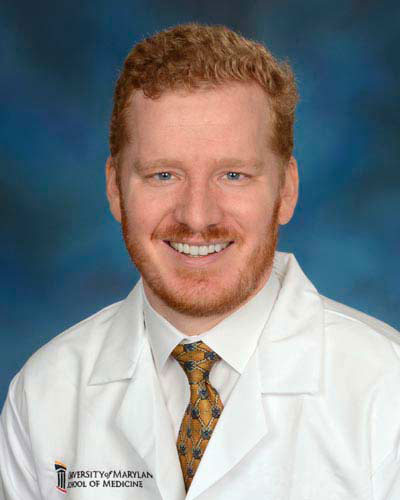
Stewart Becker, PhD, DABR
Associate Professor
Dr. Becker is an Associate Professor in the Department of Radiation Oncology at the University of Maryland School of Medicine. He received his doctorate from University of Wisconsin-Madison in Medical Physics. Dr Becker’s research focuses on developing and implementing new radiation treatment devices and techniques. He is the lead physicist for the GammaPod breast radiosurgery device for which he has published extensively on and travels the world to help other hospitals start their new GammaPod programs. In addition to his clinical and research duties Dr Becker is the Director of the Physics Course for Radiation Oncology residents as well as serving as the Department’s Radiation Safety Officer and liaison MDE as a member of the State of Maryland Radiation Control Advisory Board.

Binny Bhandari, MS
Laboratory Manager
Binny Bhandary has earned her Bachelor of Science degree in Biology from Salem College, NC. She has a Masters in Science in Biology degree from Kansas State University. She has also received a Graduate certificate in Research Administration from University of Maryland, Baltimore. Her research interests are in the various fields of biology including molecular/cellular biology, genomics, transcriptomics, radiation biology and others.

Nrusingh Biswal, PhD, DABR
Assistant Professor, Program Director
Dr. Biswal is an Assistant Professor in the School of Medicine at the University of Maryland, Baltimore. He received his Doctoral Degree in Electrical Engineering from University of Connecticut, Storrs and completed two years of post-doctoral fellowship in Radiology at Baylor College of Medicine, Houston. He has completed three years of Residency Program in Therapeutic Radiation Oncology Physics at Rush University Medical Center, Chicago. Dr. Biswal is a Clinical Medical Physicist in Radiation Oncology, licensed by the American Board of Radiology. His current research focuses on proton therapy, predicting radiation induced skin toxicities, studying tumor microenvironment during the course of treatment, molecular imaging and treatment of tumor hypoxia and tumor hyperthermia. He teaches Medical Physics classes to Radiation Oncology Residents and Dosimetry Students

Jochen Cammin, PhD, DABR
Assistant Professor
Dr. Cammin received his Ph.D. in experimental particle physics from the University of Bonn in Germany in 2004. He continued to study the fundamental particles and forces as a postdoctoral researcher using high-energy particle accelerators at Fermilab (Batavia, IL) and at CERN (Switzerland). Dr. Cammin transitioned to the field of medical physics in 2009 when he joined the Johns Hopkins University in Baltimore. His research focused on CT image reconstruction and novel detectors for computed tomography. In 2015 he obtained a Certificate in Medical Physics from the University of Pennsylvania in Philadelphia. Dr. Cammin completed his residency in therapeutic medical physics at Washington University / Barnes-Jewish Hospital in St. Louis in 2017 where he then worked as a clinical medical physicist and faculty member. Dr. Cammin joined the Department of Radiation Oncology at the University of Maryland Medical Center in 2020 as an Assistant Professor

Yushi Chang, PhD, DABR
Assistant Professor, Associate Program Director
Dr. Yushi Chang joined University of Maryland, Baltimore in July 2023 as Assistant Professor and Medica Physicist in the Department of Radiation Oncology, after completing her radiation therapy physics residency at University of Pennsylvania. She received a bachelor's degree in Optical Science & Technology at Sun Yat-sen University, China, a master's degree in Medical Physics at Duke Kunshan University, China, and a PhD degree in Medical Physics at Duke University, NC, USA. Her research interests include Radiomics, AI in image synthesis, AI in image-guided radiation therapy.
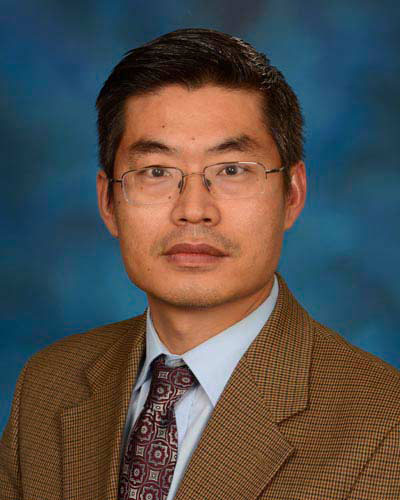
Shifeng Chen, PhD, DABR
Professor, Chief of Clinical Physics
Dr. Shifeng Chen received his PhD in experimental nuclear physics from Florida State University in 2006. He completed his post-doc training in medical physics at Duke University Medical Center in 2008. He was an ABR-certified clinical physicist and an assistant Professor at University of Nebraska Medical Center from 2008 to 2012, and was relocated to the University of Maryland School of Medicine in 2012.Currently Dr. Chen is a professor and Clinical Chief Physicist in the Department of Radiation Oncology at the University of Maryland School of Medicine. He has also assumed the role as Director of the Medical Dosimetry Program. Dr. Chen oversees daily operation of 6 centers treating about 300 patients daily, equipped with twelve medical linear accelerators, two High-dose-rate Units, one gammaKnife, one gammaPod, six CT scanners, 1 MRI scanner, and one proton treatment center with five gantry rooms.
Dr. Chen has provided significant service to the AAPM. He has served as the member of JACMP Board of Editors since 2014 and the member of AAPM membership committee since 2017. He has served guest associate editor and reviewer for Medical Physics, and an Associate editor for JACMP. Dr. Chen also served as abstract reviewers for the AAPM annual meeting. In addition to the journals of AAPM, Dr. Chen also servers reviewers for other renowned journals, such as red journal, and PMB.
Dr. Chen advanced the medical physics knowledge through his original research in machine learning and data mining. He is the original researcher who applied machine learning method/data mining in Radiation Oncology. His four original publications about 4 statistical models (forward neural network, decision tree, support vector machine, and self-organizing map) have been widely used in Radiation oncology big data research. He is the first research who introduced the “cross-validation” method in Radiation Oncology. Dr. Chen has authored and co-authored 87 peer-reviewed journal articles, and co-authored 106 conference abstracts.
Dr. Chen has been actively involved in medical physics educational activities. He has mentored 10 physics residents, 11 dosimetry students, 4 radiation oncology residents, 2 summer students, and 1 post-doc researcher. He is one of major physicists who build up CAMPEP-accredited medical physics resident program at the university of Maryland school of Medicine. From 2016 to present, he has been serving the director of medical dosimetry program at the University of Maryland Medical Center. As a clinical chief physicist, He has mentored many junior physicists.

Aurn Gopal, PhD, DABR
Assistant Professor
Dr. Arun Gopal has been a board certified clinical faculty physicist at the University of Maryland Baltimore since 2014. Before joining the University Of Maryland School Of Medicine, he was a medical physicist at New York Presbyterian Hospital Columbia University (2012 – 2014). He completed his PhD in Nuclear and Radiological Engineering in 2009 and his radiation oncology medical physics residency in 2012 at the University of Florida. He also completed a master’s degree in biomedical engineering from the University of Tennessee Health Science Center in 2004. Dr. Gopal spends most of his time at Baltimore Washington Medical Center covering external beam and brachytherapy physics for the Tate Center. He also oversees the linac quality assurance and regulatory compliance program for the University of Maryland Radiation Oncology department. His research interests include image guided radiation therapy (IGRT), surface guided radiation therapy (SGRT), portal dosimetry, treatment planning, deformable image registration and adaptive therapy. He is a strong believer in clinical medical physicists stepping beyond their traditional role as radiation safety gatekeepers to playing a more direct role in designing and managing radiation oncology programs. Armed with a unique perspective from understanding radiotherapy physics, treatment machines, and real world clinical uncertainties, medical physicists can and must play greater upstream (consults and treatment planning) and downstream roles (treatment set-up and delivery oversight) towards improving overall patient care
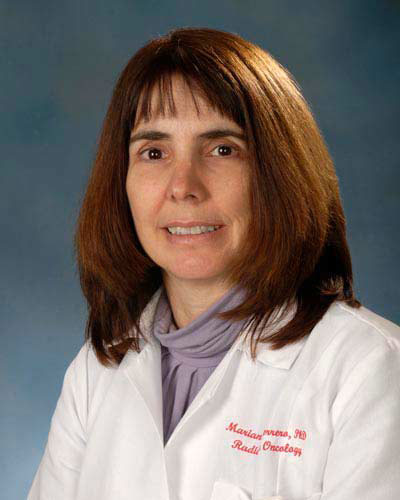
Mariana Guerrero, PhD, DABR
Professor
Dr. Guerrero is a Medical Physicist in the Radiation Oncology Department. She received her PhD from the University of California, Irvine. She trained as a post-doctoral fellow at T-11, Los Alamos National Laboratory, Los Alamos, New Mexico. In 2001 she joined the University of Maryland School of Medicine as a post-doctoral fellow and in 2004 as an Assistant Professor at the Department of Radiation Oncology. From 2006 to 2009 she worked as a Medical Physicist at the Veterans Administration Hospital in Washington DC. In 2009, she re-joined the Department of Radiation Oncology at the University of Maryland School of Medicine as a Clinical Assistant Professor and is currently a Professor. She participates in a wide range of clinical activities: She is responsible for overseeing Medical Physics coverage of prostate seed implants program (I-125 and Cs-131); provides physics clinical coverage of external beam treatments, high-dose rate brachytherapy treatments, Yttrium-90 liver infusions and external and interstitial thermal therapy. She is board-certified in Therapeutic Medical Physics by the American Board of Radiology (ABR).
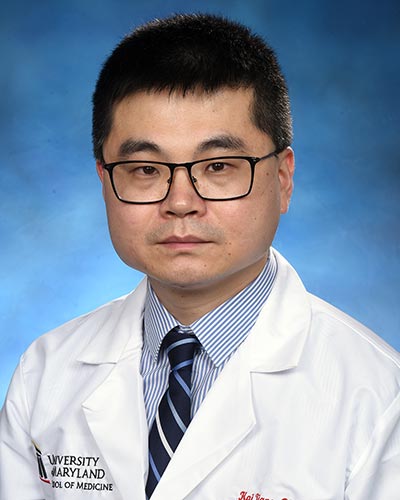
Kai Jiang, PhD, DABR
Assistant Professor
Dr. Jiang is an assistant professor in the Department of Radiation Oncology at the University of Maryland School of Medicine (UMSOM). His areas of expertise include radiation therapy and biomedical imaging with emphasis in magnetic resonance imaging (MRI). At the UMSOM, he has dual appointments as both a medical physicist in the University of Maryland Medical System (UMMS) and a radiation physicist in the Division of Translational Radiation Science (DTRS). At UMMS, he provides clinical physics services such as radiotherapy machine quality assurance (QA), treatment planning, patient-specific QA, and quality control of patient treatment etc., with the aim of promoting quality cancer care with radiation therapy. Besides, he is also actively involved in clinical research projects aimed to develop novel radiotherapy technologies to advance the radiotherapy of cancer patients. At DTRS, he is the director of radiation physics and lead the physics group in supporting radiation research using clinical linear accelerators and preclinical kV irradiators (including the XRAD-320 irradiators and a small-animal radiation research platform), as well as establishing a small-animal imaging program using MRI and computed tomography. Prior to his appointment at the UMSOM, he was a researcher specialized in cardiovascular and renovascular MRI. Dr. Jiang has published 40+ peer-reviewed journal articles and two book chapters. He is also actively involved in teaching and has mentored 20+ undergraduate and graduate students/trainees.
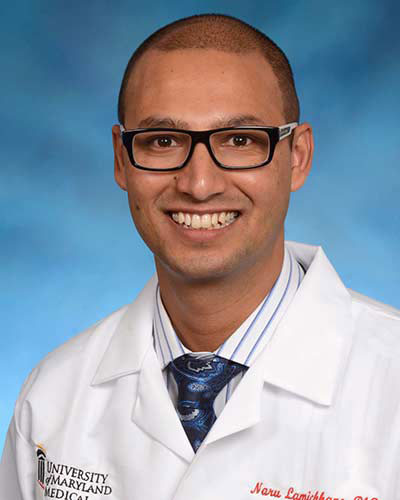
Narottam (Naru) Lamichhane, PhD, MBA, DABR
Associate Professor
Dr. Naru Lamichhane joined the Department of Radiation Oncology at the University of Maryland School of Medicine in 2016. He attended Arcadia University in Glenside, PA where he received his Bachelor of Science in Applied Physics and Chemistry. He then went on to finish his Doctorate in Medical Physics at Virginia Commonwealth University in Richmond, VA. He finished his Therapeutic Medical Physics residency from Sylvester Comprehensive Cancer Center at the University of Miami Miller School of Medicine. His research interest likes in molecular and quantitative imaging, nanotechnology in radiation therapy, biomarkers and imaging, treatment planning and quality assurance.
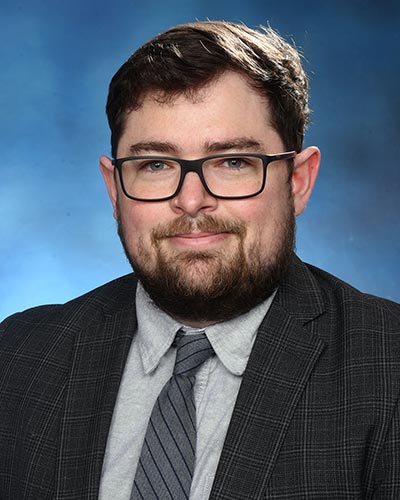
Michael MacFarlane, PhD, DABR
Assistant Professor
Michael earned his Bachelor of Science degree in Mathematical Physics from the University of Waterloo, as well as a Master of Science in Clinical Medical Biophysics and a Doctor of Philosophy in Medical Biophysics from the University of Western Ontario. He then completed a medical physics residency at the University of Maryland School of Medicine where he now is an assistant professor and a practicing medical physicist. His research focuses on improving the efficiency and quality of radiation therapy treatment plans and on the precision of radiation treatment delivery.

Sarah McAvoy, MD
Assistant Professor
Dr. McAvoy is an Assistant Professor of radiation oncology at the University of Maryland School of Medicine. Dr. McAvoy completed a bachelor’s degree at Carroll College. She then spent several years conducting research in the area of genomic instability in cancer at Mayo Clinic. She then went on to receive her medical degree from the University of Minnesota School of Medicine. She completed an internship at Hennepin County Medical Center and a residency in radiation oncology at the University of Texas MD Anderson Cancer Center where she served as a chief resident and received the Dr. Mary Fletcher Award for excellence in clinical care. She is board certified by the American Board of Radiology.Dr. McAvoy has several years of experience in practice and treats all sites of cancer. She has a special interest in women’s health and treating breast and gynecologic cancers. She specializes in various radiation advanced technologies, including stereotactic body radiation therapy (SBRT), GammaPod (which is available at the University of Maryland Marlene and Stewart Greenebaum Comprehensive Cancer Center), and proton therapy (available at the Maryland Proton Treatment Center). Dr. McAvoy also has a special interest in the treatment of brain and spine tumors as well as thoracic tumors. Dr. McAvoy’s research focus has been on glioblastomas, thoracic radiation, reirradiation, and normal tissue toxicity. She has numerous peer-reviewed publications in these arenas and has given many national presentations of her work.
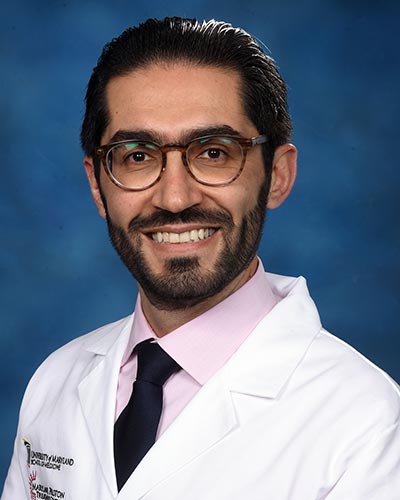
Sina Mossahebi, PhD, DABR
Associate Professor
Dr. Mossahebi is an Assistant Professor at the Department of Radiation Oncology. He earned his PhD in Physics/Biophysics from Washington University in St. Louis, MO. Dr. Mossahebi’s PhD research focused on kinematic characterization of left ventricular chamber stiffness and relaxation to quantify diastolic physiology and facilitate the development of mechanistic indexes for diastolic function. Following his PhD, Dr. Mossahebi completed his Therapeutic Medical Physics residency at the University of Maryland School of Medicine. In 2017, he joined Maryland Proton Treatment Center as an Assistant Professor at the Department of Radiation Oncology. Dr. Mossahebi mentors several rotations in the Medical Physics Residency Program.
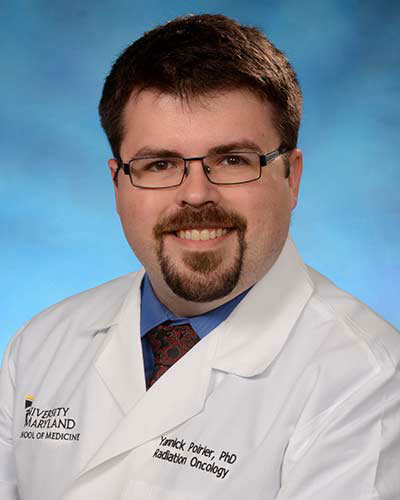
Yannick Poirier, PhD, DABR
Assistant Professor
Dr. Poirier joined us from Canada in 2016 from the Tom Baker Cancer Centre where he was a Physicist. He currently divides his time between clinical physics support at the University of Maryland Medical Centre and the Division of Translational Radiation Science, where he provides physics support for the small-animal radiation research platform (SARRP). He specializes in the modeling and experimental dosimetry of low-energy kilovoltage x-ray sources. Dr. Poirier is board-certified by both the Canadian College of Physicists in Medicine (CCPM) and the American Board of Radiology (DABR).
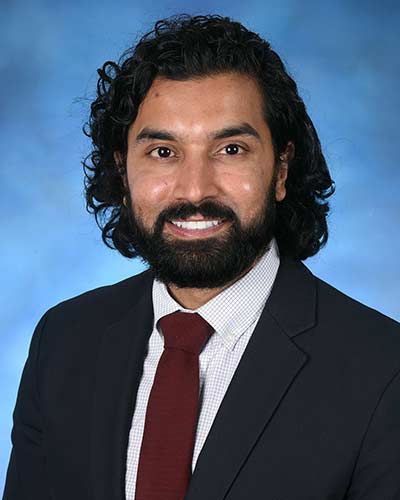
Zaker Rana, MD
Assistant Professor
Dr. Rana graduated from the College of William and Mary in Williamsburg, VA, received his medical degree from Howard University College of Medicine in Washington DC in 2015 and completed his internship at Riverside Regional Medical Center in Newport News, VA. He recently completed his Radiation Oncology residency training at Northwell Health in New Hyde Park, NY where he served as Chief Resident. Training in the New York City area provided broad clinical exposure and included high case volumes of stereotactic radiosurgery, stereotactic body radiation therapy, and brachytherapy. Dr. Rana participates in all of our departmental missions to include patient care, teaching of residents and medical students, and clinical research. Dr. Rana has been active in research during his training years and his clinical and research efforts have yielded 15 publications and 41 presentations at the national and international level. Dr. Rana treats all sites of cancer. Overall, Dr. Rana strives to provide excellent clinical care in a team-based approach within the Marlene and Stewart Greenebaum Comprehensive Cancer Center and The Tate Cancer Center at UM Baltimore Washington Medical Center
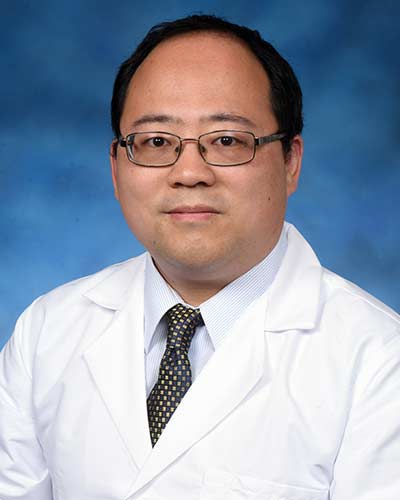
Lei Ren, PhD, DABR
Professor
Dr. Ren is currently a Professor and Director of Physics research in the Radiation Oncology department at University of Maryland and an adjunct faculty at Duke University. He received his B.S. degree from the Academic Talent Program at Tsinghua University in China, and his Ph.D. degree from the Medical Physics Program at Duke University. He is certified by the American Board of Radiology (ABR) in Therapeutic Medical Physics. In research, Dr. Ren’s focus is image-guided radiation therapy (IGRT), including imaging dose reduction, image reconstruction, synthesis, augmentation and registration, 4D imaging, and applications of AI in IGRT. He has published over 70 papers in peer-reviewed journals, including featured articles, and several book chapters. His lab has been funded by both NIH and Industry grants and has won multiple awards from AAPM, ASTRO, and ISMRM. Dr. Ren regularly provides scientific reviews for peer-reviewed journals, conferences, book proposals, and NIH grant applications. He has served in editorial roles for different journals and has been actively involved in multiple committees at AAPM and ASTRO. Dr. Ren has mentored over 30 Ph.D. and master students and received the Mentorship Award from Duke Medical Physics program. He was elected as a Fellow of AAPM in 2020.

Amit Sawant, PhD, FAAPM
Professor, Vice Chair for Medical Physics
Dr. Sawant is a medical physicist and an imaging scientist. His research interests focus on developing and translating novel forms of image-guidance in radiation therapy, specifically in the area of stereotactic ablative radiotherapy (SAbR), also known as SBRT. The overall goal of his research is to fundamentally improve the understanding, diagnosis, and treatment of cancer through pre-clinical and clinical investigations and translation of novel forms of cancer imaging, radiobiologic agents and precision radiotherapy

Dr. Hem. D. Shukla
Assistant Professor
Dr. Shukla received his PhD in Biochemistry at R. D. University Jabalpur in India and completed his post-doctoral training from University of Massachusetts. Later, he finished his training in cancer biology from National Institutes of Health and Institute of Cell Engineering at Johns Hopkins University School of Medicine. The main focus of his research is radiation induced modulation of immuno-suppressive tumor microenvironment in pancreatic and non-small cell lung cancers. His lab is also interested in cancer immunotherapy, and using targeted therapeutics to inhibit specific pathways mutated in cancers. Dr. Shukla has taught “human genomics and genetics for clinical application” for nurses in Baltimore Washington Medical Center and Anne Arundel Medical Center and helped design this course for School of Nursing, Notre Dame of Maryland University.
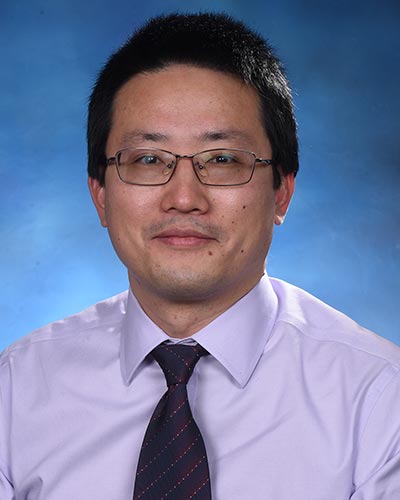
Junliang Xu, PhD, DABR
Assistant Professor
Dr. Junliang Xu joined University of Maryland on July 2020 as Assistant Professor in the Department of Radiation Oncology, after the completion of his medical physics residency at Fox Chase Cancer Center in Philadelphia, PA. He received a Bachelor of Theoretical Physics at the University of Science & Technology in China. He completed his Ph.D. in Physics at Kansas State University, followed by his Postdoctoral Fellowship in the Department of Physics at The Ohio State University. His research interests include FLASH therapy, Linac-based SRS, single vocal cord IMRT/SBRT, dual-energy CT, and radiobiology.
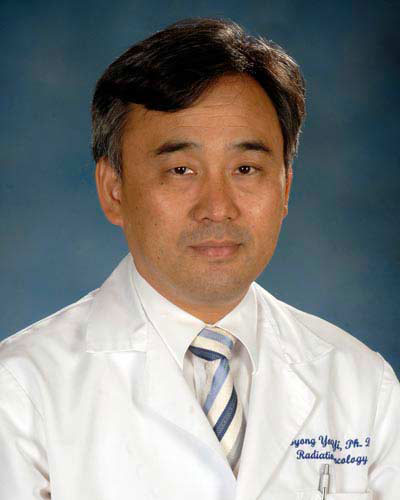
Byong Yong Yi, PhD, DABR
Professor, Director of Proton Physics
Dr. Byong Yong Yi joined the Department of Raidaiton Oncology at the University of Maryland School of Medicine as an associate Professor and clinical director of the Physics Division in 2005, after 16-years of service as a Chief Medical Physicist and Professor of the Department of Radiation Oncology at the Asan Medical Center and University of Ulsan School of Medicine in Seoul Korea. Dr. Yi earned his doctoral degree in physics at Yonsei University in Seoul Korea. He obtained clinical training as a medical physicist at Hanyang University, 1987-1989. He has been certified by the medical physics boards, the Korean Board of Medical Physics in 1993 and the American Board of Radiology in 2008. He found the Medical Physics Residency Program at University of Maryland Medical System, which has been accreditted by the Commission on Accreditation of Medical Physics Education Program (CAMPEP) and had served as a director, 2012-2016

Baoshe Zhang, PhD, DABR
Associate Professor
Dr. Baoshe Zhang received his Ph.D. in Physics at the Hong Kong University of Science and Technology in 2003. Dr. Zhang is currently an Assistant Professor in the Department of Radiation Oncology at the University of Maryland School of Medicine. Following his graduate training, he joined the University of Lethbridge in Canada as Research Associate. While there, he developed a second-generation sub-millimeter Fourier transform spectrometer for the James Clerk Maxwell Telescope in Hawaii and worked on the spectral and photometric imaging receiver project for the Herschel Space Observatory of European Space Agency. He then moved to the Department of Radiation Oncology at Virginia Commonwealth University as a faculty member where he was working on Image-Guided Adaptive Radiation Therapy.
Next Steps
Your path to success starts here